The 15 second-semester students installed electrical service at Lime Bluff Recreation Area in Hughesville. What began in the heat of August ended in December’s chill as the students worked about five hours a week at the complex.
“The work they did can’t be replicated in the lab due to the nature of it,” said Joseph R. Raup, instructor of electrical technology/occupations and teacher of the Construction Lab II-Commercial course charged with the project. “We don’t have the area to do the trenching and the underground type of work.”
 Such work was required at the 62-acre park. The students – seeking an associate degree in electrical technology – fit most of the approximately 2,000 feet of conduit underground before pulling through about a mile of electrical wire. Connecting the wire to two transformers and panels also installed by the students delivered the electric service long sought by the East Lycoming Recreation Authority, which oversees the park.
Such work was required at the 62-acre park. The students – seeking an associate degree in electrical technology – fit most of the approximately 2,000 feet of conduit underground before pulling through about a mile of electrical wire. Connecting the wire to two transformers and panels also installed by the students delivered the electric service long sought by the East Lycoming Recreation Authority, which oversees the park.“Most of the other parks around do have provisions for power for crockpots and other things people tend to bring to gatherings,” explained Jeff Bower, chairman of the East Lycoming Recreation Authority. “We found we were probably losing some opportunities for people to use this park because we didn’t have access to those kinds of facilities.”
Thanks to the students, one pavilion and a maintenance building have power and LED lighting. Electric service for the park’s other two pavilions will be completed by another Penn College class during the spring semester.
“There are enough outlets and enough power with the outlets to run approximately half a dozen crockpots and hotplates. It will accommodate a nice picnic,” Raup said with a smile.
The semester-long project was no picnic for the students. Extremely wet conditions during the first several weeks forced the class to rely on leaf blowers and heavy duty wet-dry vacuum cleaners to remove excess water from the conduit. Running the conduit itself proved to be challenging due to the bends required to reach the pavilions. Handling over 5,000 feet of heavy electrical wire and trying to finish the complex job in freezing temperatures added to the challenge.
But the students would have it no other way.
“We learn a lot in lab, but seeing and overcoming obstacles put in front of you in the real world is where it’s at,” said Richard A. Baney, of Trout Run. “I got to do stuff that I wouldn’t normally do if we were at the lab at school. It’s very valuable.”
“It’s good to get that real-world experience and see what everything is about firsthand, because this experience is not something you can get in the classroom,” said Ian J. Chilcote, of Altoona. “I feel you learn more out here than in the classroom.
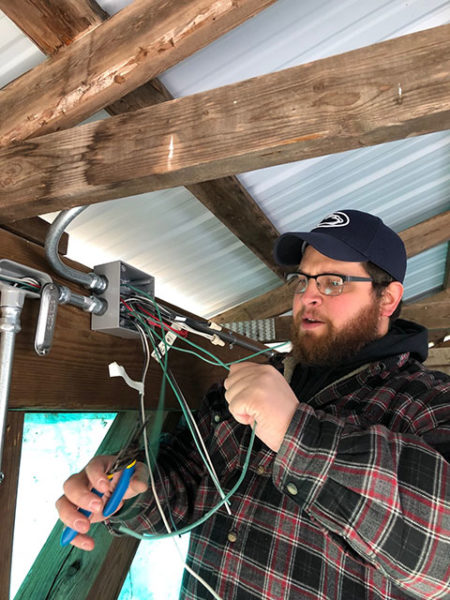 “To seek employment, they always ask, ‘What’s your experience level and what experience do you have?’ Well, this project is a perfect example of experience.”
“To seek employment, they always ask, ‘What’s your experience level and what experience do you have?’ Well, this project is a perfect example of experience.”The college’s involvement with the approximately $35,000 grant-funded project began over a year ago when students in the Electrical Drawing and Print Reading course – taught by Eric W. Newcomer, lecturer of electrical technologies/occupations – crafted drawings and blueprints of the proposed electrical system for permitting purposes.
“They have really saved us a ton of money, both in drafting and the electrical work and the hours the students have put in,” said Thomas Zavalydriga, who served as project director for the East Lycoming Recreation Authority. “I’ve been in management all my professional career, and these students have done just an outstanding job from a professional standpoint and a personal standpoint.”
Their instructor agreed. “Overall, I would give them an ‘A,’” Raup said.
“I could not be prouder of the work our students did on this project,” said David R. Cotner, dean of Penn College’s School of Industrial, Computing & Engineering Technologies. “This entire process has served as a tremendous example of how a project can enhance students’ ‘degrees that work’ and simultaneously benefit the community. It’s a win for the students as well as for the park and its patrons.”
The students appreciated the initiative’s community focus.
“We actually got to go out and do something for the public. That’s what’s nice,” Baney said. “It’s a park, so you know for years to come people are going to be enjoying what these guys and myself actually helped put together.”
Added Chilcote, “I actually plan on coming back and saying, ‘Hey, I did that.’”
In addition to Chilcote and Baney, the following students worked at the park throughout the semester: Ethan Y. Boedker, Bloomsburg; Daniel F. Clark, Royersford; James A. Dansereau, Williamsport; Derrik T. Holton, Canton; Erik C. Huey, Frenchtown, New Jersey; Dominic E. Kulina, Harrisburg; Jordan L. Nasoni, St. Marys; Zachary R. Nugent, Russell; Ryan S. Pellow, Perkasie; Kenneth L. Rounds III, Stafford, Virginia; Daniel L. Sherman, Fayetteville; Cole E. Taylor, Orangeville; and Noah A. Treaster, Lewistown.
Raup also thanks Kevin J. Snyder, instructor of electrical technologies/occupations, for providing engineering advice during the project.
A video documenting the students’ work at the park can be viewed on the college's YouTube channel.
Electrical majors at Penn College include the associate degree in electrical technology, an associate degree in mechatronics engineering technology, and a bachelor’s degree in building automation technology.
Information about those majors and other programs offered by the college’s School of Industrial, Computing & Engineering Technologies is available by calling 570-327-4520.
For information about Penn College, a national leader in applied technology education, email the Admissions Office or call toll-free 800-367-9222.
– Photos by Tom Speicher, writer/video editor
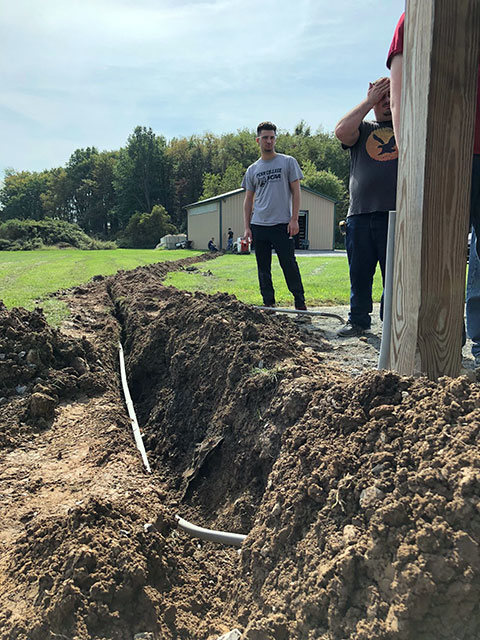
... and they really "dug" their work despite the arduous process.
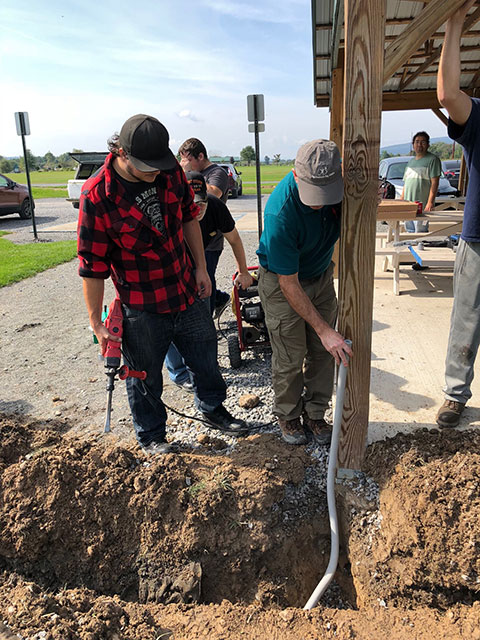
The location of park pavilions made running conduit a challenge.
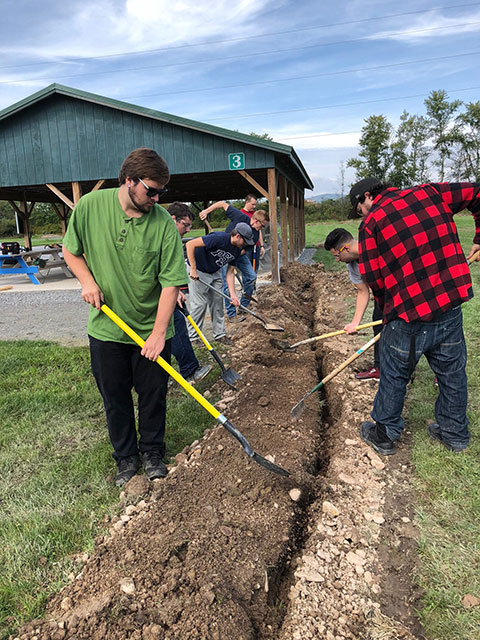
Electrical students installed more than 2,000 feet of conduit – most of it underground – in their successful effort to deliver electricity ...
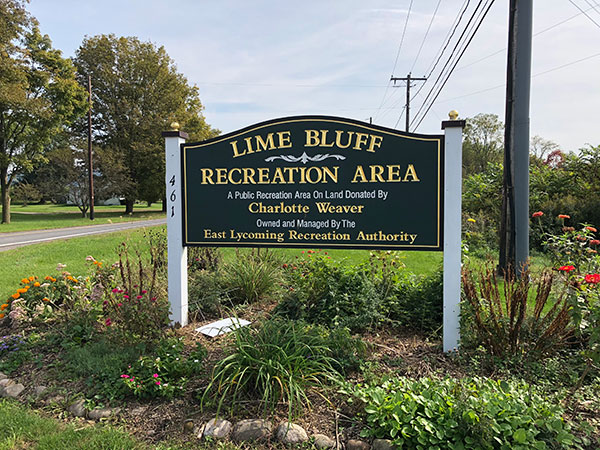
The power project adds value to an already well-used facility.

The students had to “pull through” about a mile of electrical wire.

Let there be light!
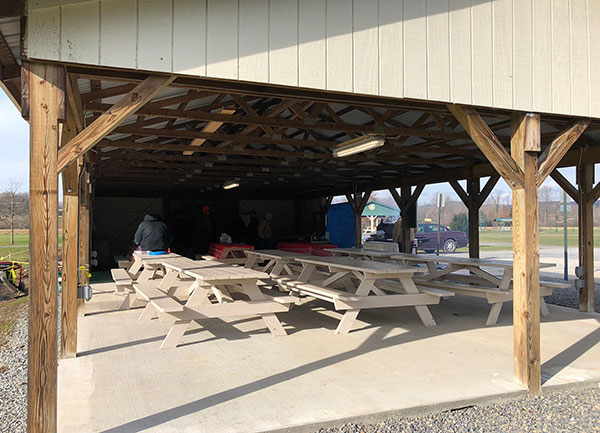
For the first time, a park pavilion has electricity.
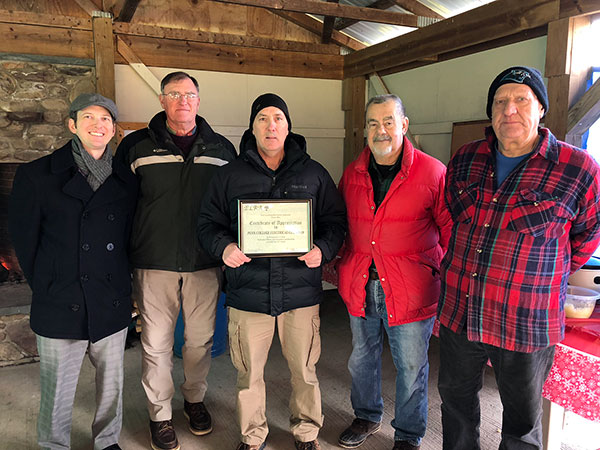
Officials from Penn College and the East Lycoming Recreation Authority commemorate the work of the college’s electrical students at Lime Bluff Recreation Area in Hughesville. From left are: Bradley M. Webb, assistant dean of industrial, computing and engineering technologies; Jeff Bower, authority chairman; Joseph R. Raup, instructor of electrical technology/occupations; Thomas Zavalydriga, project director for the authority; and Wayne Hyde, community volunteer.
